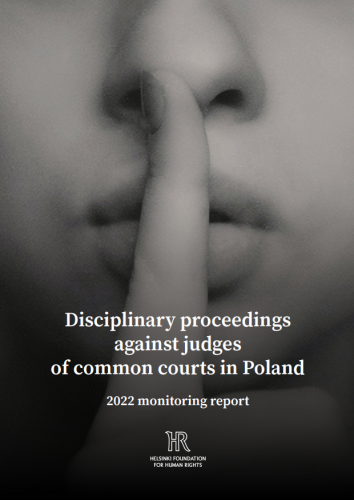Report "Disciplinary proceedings against judges of common courts in Poland"
The changes to the judiciary introduced by the ruling majority have also extended to the system of disciplinary responsibility of common court judges. Since 2018, there have been examples of disciplinary proceedings initiated, for example, in relation to the content of judges' rulings or their public statements, and the very design of the disciplinary system has been challenged by international courts as incompatible with EU law and the European Convention on Human Rights. The HFHR's latest report summarises the results of its monitoring of selected disciplinary cases of judges pending under the ongoing rule of law crisis in 2022.
Monitoring of disciplinary proceedings
From March to July 2022 the Helsinki Foundation for Human Rights conducted monitoring of twelve disciplinary proceedings, which included cases of judges of common courts pending before courts of first instance and the Disciplinary Chamber of the Supreme Court. The monitoring included both cases in which there may have been an element of political motivation (e.g. proceedings concerning a judge's critical statement about a politician on social media) and those concerning "common" disciplinary offences (e.g. untimely drafting of justifications).
The analysis of the conduct of disciplinary proceedings has shown, above all, their excessive length. The lengthiness of proceedings may constitute an additional reprisal against judges and, moreover, is indicative of the low efficiency of the system of disciplinary responsibility. Furthermore, in some of the cases, the participation in the panels of judges nominated with the participation of the National Council of the Judiciary as it was established in 2018 was questioned. Proceedings were conducted with respect for the procedural rights of the accused judges (in particular the right to defence) and, for the most part, in public.
Amendments to the law on disciplinary responsibility of judges and recommendations
The report also provides a comprehensive analysis of the laws adopted since 2018, taking into account the legislative changes that came into force in July 2022 at the initiative of the President of the Republic of Poland and the subsequent amendment proposals. It also refers to key rulings of international and national courts on disciplinary justice.
Due to the design of the disciplinary court system and the participation in the adjudication of judges defectively appointed by the National Judicial Council, the hearing of cases by an independent and impartial court established by law is not guaranteed in disciplinary proceedings, as part of the broader right to a fair trial. This follows from a number of rulings by the European Court of Human Rights and the Court of Justice of the EU. Meanwhile, both the changes already introduced (including the abolition of the Disciplinary Chamber and the creation of the Chamber of Professional Responsibility) and those proposed in the most recent amendment referred to the Constitutional Court by the President of the Republic of Poland do not fully implement these rulings into the Polish system.
The HFHR report summarises which elements in the system of disciplinary responsibility of judges require urgent improvement in the light of the judgments of the CJEU and ECtHR issued to date, and indicates the desired direction of change. This is particularly important as the implementation of the recommendations flowing from the CJEU rulings and the fulfilment of the "milestones" concerning the judiciary formulated in the decision of the Council of the EU are a condition for Poland to obtain funds from the European Union Reconstruction Fund.
The report was produced as part of a programme to monitor disciplinary proceedings against common court judges in Poland, carried out with funds from a grant awarded by The German Marshall Fund of the United States.



